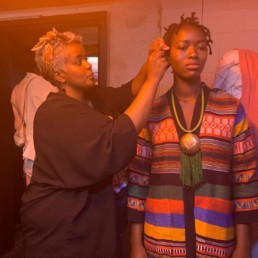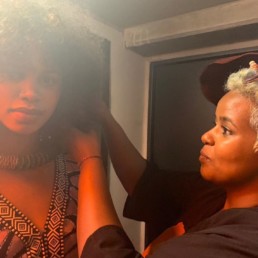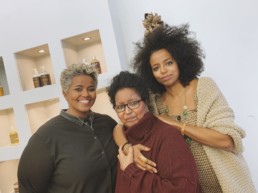“We’ll make your visions come true because nothing is impossible.” – That is the Afrosisters’ motto. The founders of the Afrosisters Salobn are two sisters of Eritrean heritage, Rima Sium & Semy Teklesembet. Since their childhood, the business or hair has been a part of their, now it has also become her career. In this interview with Rima, we talk about her work and Afro hairstyles of the past, present and future.
What’s the story behind Afrosisters?
The foundation for Afrosisters was laid in 1995, almost 25 years ago. My mother founded one of the first Afroshops in Karlsruhe; my sisters and I grew up in the shop, so to speak. Very early we inevitably learned how to handle and care for different types of afro hair. At that time the focus was on the more traditional hairstyles, such as Rastas, Dreadlocks and Cornrows, but there was also a big demand for extensions and hair relaxers.
At the age of 23, I opened another store, parallel to our existing one. The aim was to have a more modern space, tailored to the needs of our younger customers. At the same time, I had just completed my training as a stylist, make-up artist and hairdresser. My little sister also decided on the same career path and joined me in the shop. We worked side by side and complemented each other perfectly. At that time we even lived together. We constantly had new ideas and suggestions for improvements for the store, for our customers and in general: it was a really great time and a very successful new beginning.
A few years later I got pregnant for the first time. When my son was born, my sister took over the shop and hired another hairdresser to support her. By then, it was quite clear that she was no longer just become my little sister, but an equal partner who could more than represent me. In 2018 we decided together to rename our shop, which had been called Hairstyle and Make up until then. The name Afrosisters was and is much more authentic!

Where do you get inspiration for new styles?
We have a lot of different sources. On the net alone there are countless possibilities; YouTube, Instagram, Pinterest, etc. Of course, the biggest influence comes from America. On the other hand, sometimes it’s enough to just open your eyes and look around the real world. There are always new styles and individualists who try something different and inspire us.
What were your favourite styles in the past and how have they changed over the years?
To be honest, I can’t say for sure. When it comes to afro hairstyles, I’ve always liked everything. It depends first and foremost on what suits the individual best. That has something to do with the shape of the face, the type and structure of the hair.
The great thing about our hair and our hair art is that nothing is impossible. A customer can, if they want, make a complete change, walk in the shop with Afro and out with a blow out for example and vice versa of course. This requires a lot of skill, a good eye, precision and dexterity; patience and perseverance are also important. Our work requires a high degree of discipline. It has shaped us and our approach to life.
I love to create with my hands and appreciate every result as long as the customer likes it; I don’t make any distinctions.
The development of afro hairstyles was and still is strongly influenced by the media. Today it is mainly women YouTubers and reality stars who set the tone; in the past it was primarily the Afro-American music and film industry. In the 90s when bands like The Fugees, TLC, Tupac or Janet Jackson had their weddings and Set it Off was in the cinema, Rasta, Relaxer and Dreadlocks were very popular and remained so for a long time. At that time we were rarely asked about extensions and weaves in our shop. But that changed suddenly when stars like Beyonce or Rihanna stepped onto the scene and gained an extremely far-reaching influence that extended beyond the Afro-American community. With social media, everything spread quickly, so that soon everyone could know and experience everything. We then also experienced the change with our customers.
For about four years there has been a trend towards naturalness. That has to do with the political situation, particularly in America, but also with the constantly growing community here in Germany and the associated awareness work, as well as the various empowerment movements. The search for one’s own identity is becoming increasingly important. In addition, there is the influence of healthy living. Much more importance is attached to sustainability, organic products and naturalness than in the past. This has also influenced the awareness of our customers and opened up a new market for afro hair products.

Afro Hair is currently the must-have hairstyle. What is the reason why Afro Hair is worn self-confidently in Germany today?
It’s a political statement as well as a socio-cultural positioning – and all this takes place on the head, it’s practical! In addition, the whole thing looks really good. Show your colours by standing by yourself, being authentic and totally stylish; there’s no better way!
Of course it’s not as easy as I present it here. The fact that we Afro-Germans still haven’t arrived at eye level in society is painful. Unfortunately, ignorance and racism seem to be increasing more and more; a development that is emerging worldwide. I find this extremely worrying.
What does the future look like for Afrosisters? What else do you want to achieve?
The future for Afrosisters will be based on giving our customers even more attention and empathy in relation to their individual wishes and ideas. We also have a lot of catching up to do and we always want to improve and learn new things. We want to continue to encourage our clients to view their hair as a unique gift and to familiarize them with the myriad of hairstyling and care options that most people know very little about in the beginning. It is also very important for us to keep an eye on political and social developments and to take a stand. We are currently working on a number of projects in this respect. We do not want to give away too much yet, but a number of things will soon be ready for discussion. We can hardly wait to introduce you to our first project!
Which music star would you like to do the hair of?
Erykah Badu; that would be my dream. She is incredibly versatile, totally creative and has worn every hairstyle. I admire her openness and the courage to experiment without referring to common beauty ideals or trends. She is a real pioneer and completely free; a real artist. This can be seen in her music and of course in her understanding of fashion as a very individual expression, which can often not be crazy enough. A real role model!
—
One of Afrosisters’ videos was on show in the “Afro Hair District” in the exhibition “Connecting Afro Futures. Fashion x Hair x Design” at Berlin’s Museum of Decorative Arts.
—
Follow Rima: @rimasium and Afrosisters: @afrosisters_ on Instagram!

Rima Sium von Afrosisters spricht über ihre Arbeit und Afrohairstyles der Vergangenheit, des Gegenwarts und der Zukunft
“Wir setzen eure Visionen um, denn nichts ist unmöglich.” – so lautet das Motto der Afrosisters. Die Gründerinnen des Salons sind zwei Schwestern eritreischer Herkunft, Rima Sium & Semy Teklesembet. Seit ihrer Kindheit ist das Geschäft mit den Haaren ein Teil ihres Lebens, nun ist es auch ihre Karriere geworden. Im Interview sprechen wir mit Rima über ihre Arbeit und Afrohairstyles der Vergangenheit, des Gegenwarts und der Zukunft.
Was ist die Geschichte hinter Afrosisters?
Der Grundstein für Afrosisters wurde im Jahr 1995, also vor fast 25 Jahren, gelegt. Meine Mutter gründete einen der ersten Afroshops in Karlsruhe; meine Schwestern und ich wuchsen sozusagen im Laden auf. Schon sehr früh und ganz unweigerlich erlernten wir daher den Umgang mit und der Pflege von verschiedenen Afrohaar-Typen. Damals lag der Schwerpunkt vor allem auf den traditionelleren Frisuren, wie Rastas, Dreadlocks, Cornrows, aber auch in Bezug auf Extensions und Haar-Relaxer war die Nachfrage groß.
Mit 23 Jahren eröffnete ich parallel zu unserem bereits bestehenden Geschäft ein weiteres. Es sollte etwas moderner werden und speziell auf die Bedürfnisse unserer jungen Kunden zugeschnitten sein. Parallel dazu absolvierte ich eine Ausbildung zur Visagistin, sowie eine Ausbildung zur Friseurin. Meine kleine Schwester entschied sich schließlich auch für denselben Berufsweg und schloss sich mir kurz darauf an. Wir arbeiteten Seite an Seite und ergänzten uns hervorragend. Zu der Zeit wohnten wir sogar zusammen. Wir hatten ständig neue Ideen und Verbesserungsvorschläge für den Laden, für unsere Kunden und überhaupt: es war eine wirklich tolle Zeit und ein sehr erfolgreicher Neubeginn.
Einige Jahre später wurde ich zum ersten Mal schwanger. Als mein Sohn dann zur Welt kam, übernahm meine Schwester den Laden und stellte eine weitere Friseurin ein, die sie unterstütze. Spätestens da war dann ganz klar, dass sie nicht mehr nur meine kleine Schwester, sondern längst eine ebenbürtige Partnerin geworden war, die mich mehr als würdig vertreten konnte. 2018 entschlossen wir daher auch gemeinsam, unseren Laden, der bis dahin Hairstyle and Make up geheißen hatte, umzubenennen. Der Name Afrosisters war und ist viel authentischer!


Wo holst du dir Inspirationen für neue Styles?
Wir haben da ganz verschiedene Quellen. Im Netz allein gibt es ja schon unzählige Möglichkeiten; YouTube, Instagram, Pinterest, usw. Natürlich kommt der größte Einfluss aus Amerika. Auf der anderen Seite reicht es manchmal aber auch, einfach die Augen auf zu machen und sich in der realen Welt umzusehen. Es gibt immer neue Styles und Individualisten, die was anderes ausprobieren und uns inspirieren.
Was waren deine Lieblingsstyles früher und wie haben sich die Hairstyles im Laufe der Jahre verändert?
Um ehrlich zu sein kann ich das gar nicht genau sagen. Wenn es um Afrohairstyles geht, mag und mochte ich eigentlich schon immer alles. Es kommt in erster Linie darauf an, wem was am besten steht. Das hat etwas mit der Gesichtsform, dem Typ und der Haarstruktur zu tun.
Das Tolle an unserem Haar und an unserer Haarkunst ist, dass nichts unmöglich ist. Eine Kundin kann, wenn sie will, eine völlige Typveränderung vollziehen, mit Afro in den Laden herein- und mit Föhnwelle herausspazieren zum Beispiel- und umgekehrt natürlich. Dazu ist viel Geschick, ein gutes Auge, Präzision und Fingerfertigkeit nötig; Geduld und Ausdauer nicht zu vergessen. Unsere Arbeit erfordert ein Hohes Maß an Disziplin. Sie hat sowohl unseren Charakter als auch die Herangehensweise ans Leben im Allgemeinen, maßgeblich geprägt.
Ich liebe es, mit den Händen zu gestalten und schätze jedes Ergebnis, solange es der Kundin gefällt; Unterschiede mache ich da keine.
Die Entwicklung von Afrohairstyles war und ist noch heute stark geprägt von den Medien. Heute geben vor allem Youtuber*innen und Realitystars den Ton an; früher war es in erster Linie die afroamerikanische Musik- und Filmindustrie. In den 90ern als Bands wie die Fugees, TLC, Tupac oder Janet Jackson ihre Hochzeiten hatten und Set it Off im Kino lief, standen Rasta, Relaxer und Dreadlocks ganz hoch im Kurs und das blieb auch sehr lange so. Auf Extensions und Weaves wurden wir in unserem Laden damals eher selten angesprochen. Das änderte sich dann aber schlagartig als Stars wie Beyonce oder Rihanna auf die Bildfläche traten und einen extrem weitreichenden Einfluss erlangten, der sich über die afroamerikanische Community hinaus erstreckte. Durch die neuen Medien beflügelt, streute sich dann alles rasend schnell, so dass bald jeder alles wissen und erfahren konnte. Den Wandel bekamen wir dann auch bei unseren Kundinnen mit.
Seit ca. vier Jahren gibt es den Trend zur Natürlichkeit. Das hat mit der politischen Lage, vor allem in Amerika, aber auch mit der stetig wachsenden Community hier in Deutschland und der damit einhergehenden Aufklärungsarbeit, sowie den verschiedenen Empowermentbewegungen zu tun. Die Suche nach der eigenen Identität wird immer wichtiger. Dazu kommt ganz klar der Einfluss den das sogenannte healthy living mit sich bringt. Auf Nachhaltigkeit, Bio und Natürlichkeit wird viel mehr Wert gelegt als früher. Auch das hat das Bewusstsein unserer Kundinnen verändert und einen neuen Markt für Afrohaarprodukte eröffnet.

Afro Hair ist derzeit die Must-Have-Frisur. Woran liegt es, dass Afro Hair heute ganz selbstbewusst in Deutschland getragen wird?
Es ist gleichermaßen politisches Statement, wie soziokulturelle Positionierung- und all das findet auf dem Kopf statt, ist doch praktisch! Dazu kommt noch, dass das Ganze richtig gut aussieht. Farbe bekennen indem man zu sich steht, authentisch ist und total stylisch dazu; besser geht’s doch eigentlich gar nicht!
Natürlich ist es nicht ganz so einfach, wie ich es hier darstelle. Dass wir Afrodeutschen immer noch nicht auf Augenhöhe in der Gesellschaft angekommen sind, ist schmerzhaft. Bedauerlicherweise scheinen Ignoranz und Rassismus immer mehr zuzunehmen; eine Entwicklung, die sich ja gerade weltweit abzeichnet. Ich empfinde das als äußerst besorgniserregend.
Wie sieht die Zukunft für Afrosisters aus? Was möchtet ihr noch erreichen?
Die Zukunft für Afrosisters wird sich darauf stützen, unseren KundInnen noch mehr Beachtung und Einfühlungsvermögen in Bezug auf ihre individuellen Wünsche und Vorstellungen entgegenzubringen. Auch wir haben viel aufzuholen und möchten uns immer aufs Neue verbessern und dazulernen. Wir möchten unsere KundInnen weiterhin dazu ermutigen, ihre Haare als einzigartiges Geschenk zu betrachten und sie mit den unzähligen Frisuren- und Pflege-Möglichkeiten vertraut machen, über die die meisten anfangs nur sehr wenig wissen. Hierbei ist es uns auch sehr wichtig, die politische und gesellschaftliche Entwicklung im Auge zu behalten und Stellung beziehen. Momentan arbeiten wir an einigen Projekten diesbezüglich. Noch wollen wir nicht zu viel verraten, aber in Kürze wird einiges spruchreif. Wir können es schon kaum erwarten, euch unser erstes Projekt vorzustellen!
Welchem Musikstar würdest du gerne die Haare machen?
Erykah Badu; das wäre mein Traum. Sie ist unfassbar wandelbar, total kreativ und hat schon jeden Hairstyle getragen. Ich bewundere ihre Offenheit und den Mut zu experimentieren, ohne sich dabei auf gängige Schönheitsideale oder Trends zu berufen. Sie ist eine echte Pionierin und völlig frei; eine richtige Künstlerin eben. Das zeigt sich in ihrer Musik und natürlich auch in ihrem Verständnis von Mode als ganz individuellem Ausdruck, der oft nicht crazy genug sein kann. Ein echtes Vorbild!
